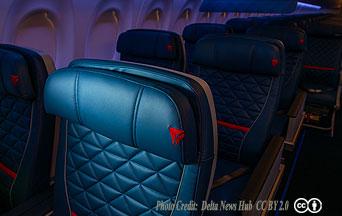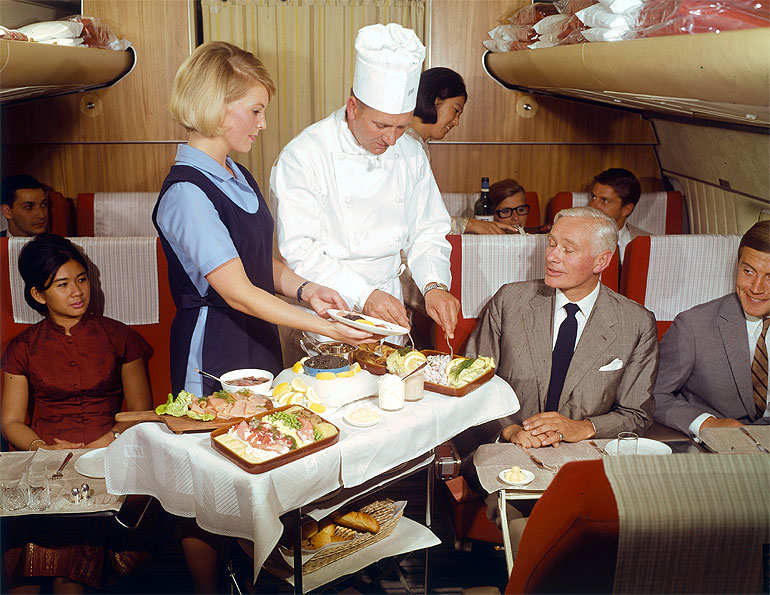
They say a rising tide lifts all boats. The same might be said for many things in life. When standards are raised high, everyone benefits. The contrary is also true: Lower standards pull everyone down.
A curious example of this doctrine is the sorry state of domestic air travel these days. Traveling by plane isn’t what it used to be. Everyone complains about lower standards. People experience crowded seating, bad service, and canceled flights. Flying has become an uncertain and exhausting adventure. Anything can happen to ruin a planned trip.
However, these complaints are not limited to economy class. First-class service is also suffering. Some experts hold that the decline of first-class service jeopardizes all service. Indeed, the low tide of bad first-class service is dragging all boats down.
And the blame can be put on the airlines, passengers, and a culture that does not appreciate beauty, refinement, and courtesy.
Science Confirms: Angels Took the House of Our Lady of Nazareth to Loreto
A Decline in Service
On the part of the airlines, the decline of first-class service is especially true for domestic flights where the differences between cabins are less pronounced. The highly competitive market of international flights still offers some worthwhile perks…for now.
Many domestic first-class travelers have noticed the decline. Some amenities are no longer available. At times, just snacks are served in place of meals. When there are meals, they are served with plasticware. It seems that all but American, Hawaiian, and Alaska Airlines have even merged it into “business class” perhaps to modify first-class expectations.1 The free drink is about the only thing that remains the same.
One major reason for the first class decline is that national flights use smaller and more energy-efficient planes. Gone are the spacious wide-body planes of times past. A squashed cabin makes all classes suffer. First-class and especially economy seats have shrunk proportionally.2
 Learn All About the Prophecies of Our Lady of Good Success About Our Times
Learn All About the Prophecies of Our Lady of Good Success About Our Times
Downgrading Economy Class
However, the decline of first class is part of a generalized movement downward. Usually, the quality of first-class and economy service work in tandem. When service in one goes down, the other follows suit.
This is because there is a constant need to make first class more attractive by keeping a proportional yet tantalizing distance between one class and another. When first class goes down, economy service goes even lower to maintain a distance between the two. Thus, in the ever more intense search for profits and cost-cutting, everyone is racing to the bottom to see who can get away with providing fewer services.
Replacing Limited Service with Self-Service
The decline of first class explains why economy service is downgrading everything. Economy seats are ever smaller and closer together. There is now a lower economy category called “basic” economy that limits carry-on bags, seat selection, and boarding privileges. The snacks are kept to a bare minimum.
Some upgrade options offer “premium economy,” featuring items once offered free. Customers can expect to pay for extra legroom with “economy-plus” seats. Anything extra accrues an additional charge.
Eternal and Natural Law: The Foundation of Morals and Law
Indeed, the tendency is to equalize all service by turning the travel experience into self-service. Passengers are expected to self-book, self-check, and self-everything. They are thus providing free services to the airlines by doing what employees once did for them.
The Passengers Are Also to Blame
It is easy to blame the first class domestic downgrade solely upon profit-squeezing airlines. However, passengers also deserve blame in bringing standards down.

The air travel conundrum reflects a changing idea of what first class means.
First class used to reflect a desire for quality and excellence. A person with class did everything with an elegance, effort, and discipline that became part of the culture. Class required a certain formality and temperance. First-class things set the standards for society as everyone imitated them as a way of participating in their excellence.
Hence, came the desire to travel with class. In this way, people could turn a routine need into an expression of culture. First-class travel used to mean that passengers acted and dressed with elegance and distinction because they were served with elegance and distinction. Travel usually involved conversation, decorum, and consideration for others that filtered down to all class categories.
Making All Passengers Equal
Such considerations no longer seem to apply in an egalitarian society.
Today, many first-class passengers dress and act like everyone else. No one pays attention to others since everyone is too busy rushing in and out of planes. Conversations are replaced with video games or private earbuds. Travel is not an expression of culture anymore. It is fast becoming a commercial activity with no social dimension.
Why Treating Everyone Equally Is a Problem
Thus, for most people, domestic first class is all about them. Its only purpose is to maximize personal comfort. It signals the ability to pay (with money or miles) for services that increase pleasure, status, and priority in line. It does not involve high standards of behavior but merely a different intensity of gratification. It means a wider seat and more space and access to the overhead bins.
Airlines can then offer first-class service that reflects the declining notion of what most people understand it to be. It leads to the blurring of distinctions and a leveling action that tends to make all passengers increasingly equal.
Low Tides = Social Decay
The sad decline of domestic first-class service mirrors general trends of decay inside society. People need cultural tides to lift their boats. They need first-class role models and things that can inspire others to excel.
They do not need merely expensive things that pander to their desires. When people are self-absorbed, they cannot see beyond their own small comfort and gratification. There exists nothing toward which people might aspire. Society falls apart for lack of cohesion and purpose.
When society fails to set high standards of excellence, everyone suffers. All boats are pulled down and risk being wrecked.
As seen on The Imaginative Conservative.
Footnotes
- Ben Schlappig, “The 6 Best Domestic Business & First Class Flights,” One Mile at a Time, 2019.
- Bill McGee, “Airline Seat Size: Will FAA Bring Relief to Squeezed Flyers?” USA Today, 2018.

